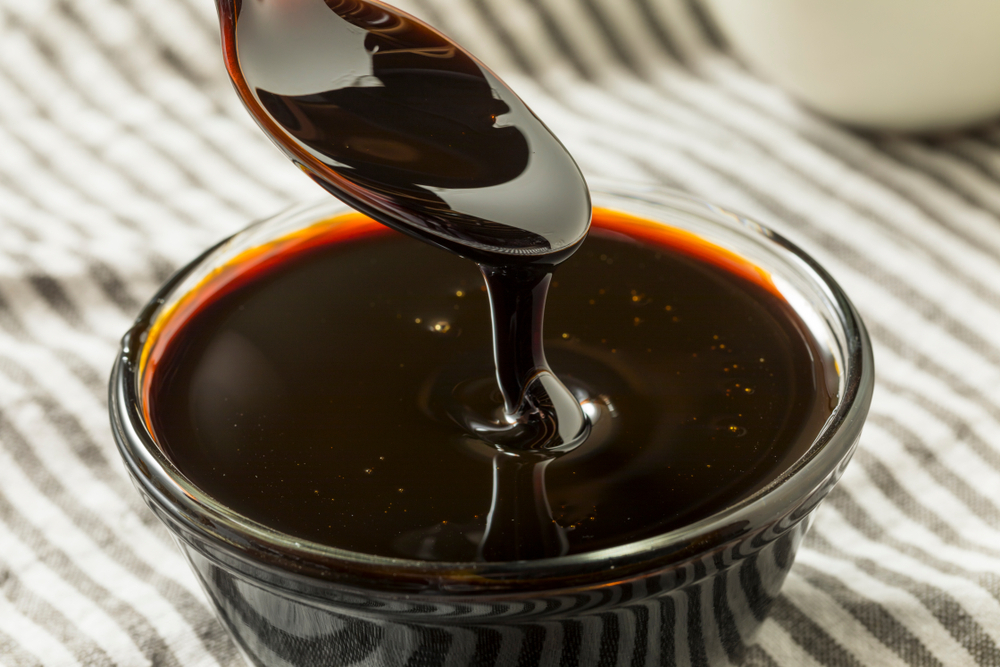Molasses is a thick syrup by-product of the sugar-making process. It’s commonly used in baking and can even be found in some dog foods and treats, but is it healthy for them?
While small amounts of blackstrap molasses may be safe to offer dogs, it’s not a healthy addition to their diet. If you’re going to make homemade dog treats with this ingredient, we recommend speaking to your veterinary team beforehand to get the green light from them, as its high sugar content makes molasses unsuitable for all dogs.
Keep reading to learn more about molasses and the risks involved in offering it to your dog.


What Are the Three Types of Molasses?
There are three main types of molasses that vary in flavor, sugar content, and consistency.
Light molasses is made from the first boiling of the cane or beet juice. It’s the lightest in color and the sweetest type, as only a tiny percentage of the sugar is extracted since it doesn’t have time to boil down. It’s commonly used in baking.
Dark molasses results from the second boiling of the cane or beet juice. It’s thicker, darker, and less sweet than the light variety. It can be used in baked goods, but it does lend a distinctive color and flavoring.
Blackstrap molasses results from the third boiling. It’s the thickest and darkest molasses and lends a bitter taste. This is the most concentrated form of molasses, offering some vitamins and minerals and the lowest sugar content of all types.


Should Dogs Eat Molasses?
Molasses—the light or dark varieties—should not be offered to your pets straight from the container as they’re just too high in sugar.
You may find blackstrap molasses-containing dog foods, treats, and homemade pet food recipes, and in tiny quantities, it may be acceptable to offer such foods to your pets. However, it’s important to remember that molasses is still a kind of sugar, and dogs that overeat sugar are at high risk of gaining weight and developing obesity-related conditions.


Dangers of Feeding Molasses to Dogs
High Sugar Content
Molasses will have differing amounts of sugar depending on the method of extraction and the age of the plant. All three types contain a lot of sugar, though the blackstrap variety has much less.
While sugar isn’t toxic, excess sugar in a dog’s diet can upset the balance of bacteria they need to digest their food, causing gastrointestinal upset. Too much sugar can also lead to excess calories and obesity, which in turn can increase the risk of joint problems, pancreatitis, and cancer.
Molasses’ high sugar content can also spike blood sugar levels, so dogs with diabetes should avoid this food completely.
Potential for Xylitol
Some molasses recipes may contain traces of xylitol. Xylitol is a common artificial sweetener that’s toxic for dogs. Even ingesting a small amount of the sweetener can be fatal for your pup.


Acrylamide Content
Blackstrap molasses contains acrylamide, a suspected carcinogen that can form in some plant-based foods when they’re exposed to high temperatures during cooking. While there are no studies explicitly focusing on dogs and their risk of cancer when consuming acrylamide-containing foods, there are studies that suggest high does cause cancer in rodents. Acrylamide can be found in many commercial dry dog foods due to the high-temperature cooking methods used.
Choking Hazard
Molasses is a thick and very gooey substance. Dogs eating molasses straight from the container may be at risk of choking due to it getting stuck in the airway.
Benefits of Feeding Molasses to Dogs
As we mentioned above, blackstrap molasses contains some vitamins and minerals that may be beneficial for dogs. It is naturally rich in iron, calcium, magnesium, and vitamin B6, all nutrients your pup requires for body processes such as oxygen transportation, bone and teeth health, and the creation of neurotransmitters.
However, your pet should get the bulk of their nutrients from commercially prepared dog food or a recipe from a Board Certified Veterinary Nutritionist. Never rely on foods like molasses to meet your dog’s nutritional needs.


Conclusion
Molasses isn’t a toxic food for dogs, but that doesn’t mean that it’s something you should be offering to them often, either. The high sugar content of light and dark varieties makes them inappropriate for everyday use, but it should be okay to provide blackstrap molasses-containing foods and homemade treat recipes occasionally so long as the bulk of your pet’s diet is coming from commercially prepared dog food. Read the label before making any recipes with molasses to ensure they do not contain xylitol.
Speak with your veterinary team before giving molasses to your dogs, especially if they have health conditions like diabetes or have other dietary concerns.
Featured Image Credit: Dmytro Zinkevych, Shutterstock






